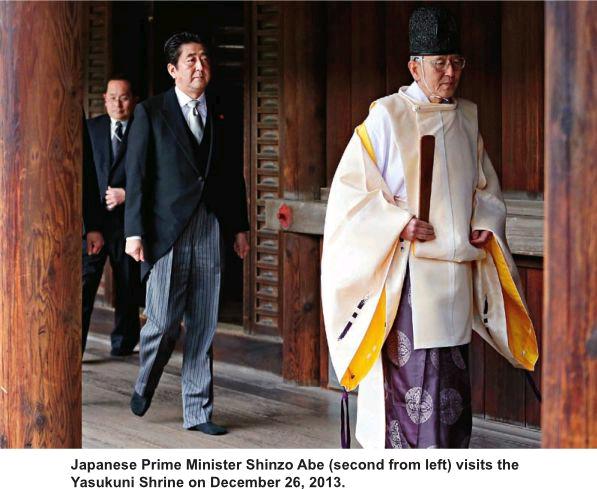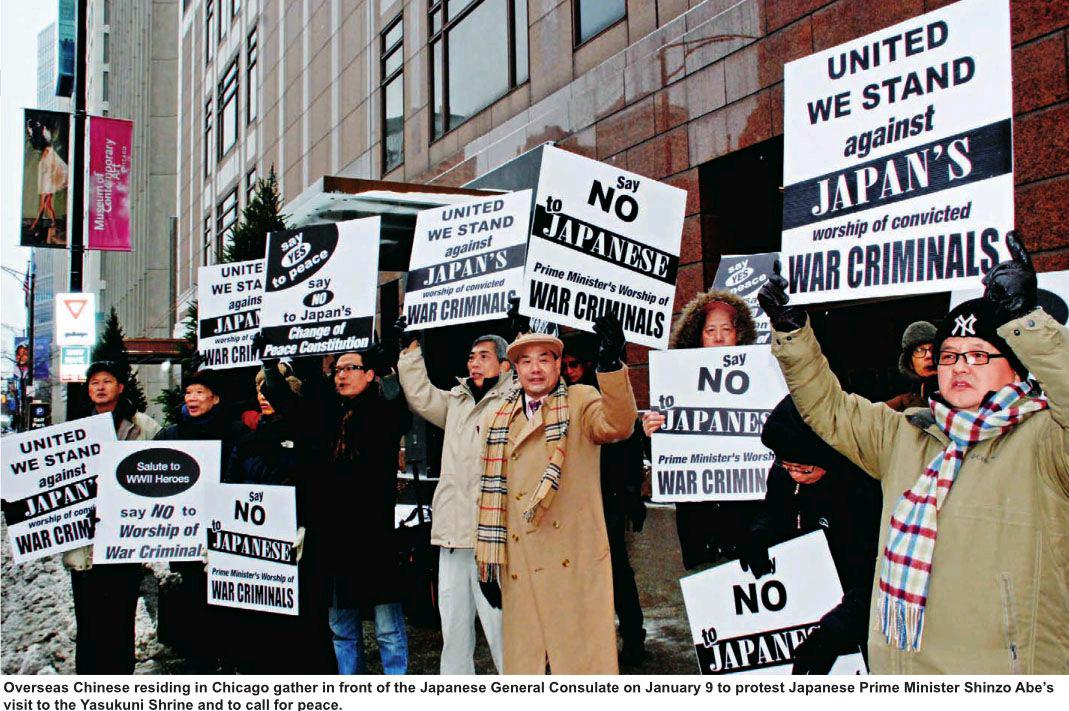More Damage to Japan’s Image
2014-03-03ByHUANGXINGYUAN
By+HUANG+XINGYUAN
MY daughter, who is studying a masters degree at Japans Waseda University, always asks me: Most people I meet in Japan are quite amiable, and Prime Minister Abe Shinzo is popular among the Japanese people, so why does China accuse Japan of deviating to the right? Shigeru Ishiba, secretary general of the Liberal Democratic Party of Japan, formerly Japans defense minister, also asked me during a China-Japan thinktank forum: Japan has kept to a peaceful road for decades since WWII, so why does China insist that Japans militarism is undergoing a revival? Well-known Japanese political journalist and TV host Soichiro Tahara asked me the same question: The friendly relationship between China and Japan has withstood many trials and tribulations, but is it now beginning to falter?
Japans shift to the right is not something created by China, but rather embodied in Japans behavior. When I went to work in Osaka 25 years ago, right-wing Japanese activists staged protests in front of the Consulate General of China. As the office director for the consulate at that time, I often met with heads of the local government and police and sometimes talked directly with representatives of the right wing. In my opinion, the latters behav- ior at that time was relatively restrained. The Japanese public indeed regarded the right wing as disjointed and fragmented. Today, however, the right-wing movement in Japan is much more organized and forthright; it is no longer satisfied with non-violent protests. Worse still, in recent years everyday people have begun to participate in right-wing activities. I wonder whether this is because the right wing has won more sympathy and support, or because the Japanese nation needs to find an outlet for pent-up emotions after years of a sluggish economy.
A look at the Japanese media shows that, in addition to the consistently right-leaning Sankei Shimbun, the Yomiuri Shimbun and NHK, both of whom have long presented a neutral image, now tend to publish radical opinions, or nod towards extreme right-wing politicians and scholars by allowing them to publish their radical views in these media. I was also surprised when one, in my eyes, right-leaning Japanese journalist told me that his colleagues criticize him for his outdated practice of being intimate with China.
As to Japanese politicians, in the past, leaders who were deemed to have made inappropriate public statements that threatened diplomatic disputes would resign. But today such problematic remarks or acts win public support. As for the issue of textbooks, the use of such teaching materials that glorify Japans aggressive war against other countries has expanded, despite growing criticism from the international community. When the popularity of a countrys right-wing prime minister, rightwing communities and right-wing textbooks so obviously grows, is it still possible to believe that this country is not shifting to the right?
With regard to whether or not militarism is experiencing a revival in Japan, I will not go into the recent aggressive military offensives conducted by the country, but will reiterate the point I recently raised in an open TV discussion. I am a supporter of Li Ying, a young Chinese director who spent 10 years in Japan producing a documentary called Yasukuni. Later, I wrote a preface for the book he wrote of the same title which was widely read in China. The documentary prompted a backlash from Japanese nationalists, who called on cinemas to stop screening the movie, but it nevertheless won awards at international film festivals. Its success does not lie in the revelations and criticisms it makes, but in the thoughtprovoking points relating to the Yasukuni Shrine it raises.
A young Japanese person told me after watching this documentary that he had never been to the Yasukuni Shrine, and did not understand why China and South Korea cannot tolerate Japans behavior in this regard. After watching the documentary, however, and seeing how the spirit of war is embodied in these historically aggressive military men and the misleading commentary presented at the Yasukuni Museum, he felt a deep sense of shame and now fully understands the terror of war. He said that he now understands why so many foreigners dont understand Japan, but emphasized that many Japanese people also regard this war-glorifying ethos as unacceptable. It is to be hoped that Japanese politicians visiting the Yasukuni Shrine will also watch and take note of this movie.
During the five years I was spokesman for the Chinese Embassy in Japan, I witnessed Japans then Prime Minister Junichiro Koizumis six visits to the Yasukuni Shrine. Since the 14 class-A war criminals were enshrined there in 1978, the shrine has become a place that Japanese politicians should avoid. To my knowledge, some of the families of these war criminals are also against visits by politicians to the shine. As the Chinese saying goes, “A burnt child dreads fire.” When associating Japans history of invasion with what Japanese leaders are doing today, it is difficult to believe that a right-wing prime minister can advocate peace while at the same time making visits to a shrine that honors class-A war criminals. Furthermore, taking into consideration the Japanese governments constitutional amendment and the passing of the Special Secrets Protection Bill it is small wonder that the countries who were victims of Japans war crimes have begun to dread the revival of militarism in the country.
I will now answer the questions that Japanese political journalist Soichiro Tahar asked: After years of amicability, is the relationship between Japan and China now beginning to falter? The China-Japan relationship has managed to develop based on their respective political foundations, emotional bonds and common interests. But the political foundation is being undermined, particularly by the prime minister. The emotional bond is hence also being damaged to breaking point. So how are the common interests of the two countries to be safeguarded? We are not worried about small issues in the bilateral relationship, but do not want to see intentionally created problems, particularly on issues concerning the Chinese sides core interests and the two countries political foundation. When Abe was elected on December 26, 2012, I published articles in the Chinese media forecasting that his taking office was equivalent to the opening of a Pandoras box. One year later, Abes actions proved these worries were not groundless. At that time, I made certain suggestions to the Japanese prime minister: First, not to take risks in territorial issues; second, not to take a long shot on the issue of visits to the Yasukuni Shrine; and third, not to isolate Japan from its neighbors. Although I know Abe will not heed my advice, I do know through others that he has read my articles. In any event, he should at least listen to what the people in his own country and in the international community have to say, and also bear in mind the future of the Japanese people.
I also have a question for Abe: A prime ministers visit to the Yasukuni Shrine constitutes a violation of Japans principle of separating the church from the state; such an action tarnishes Japans image in the eyes of not only China and South Korea, but also the United States. Does he think he can disregard all these countries in the name of his own interests? Can the international community feel at ease with a Japan that is led by a right-wing prime minister who seeks a bigger role in the international arena?
